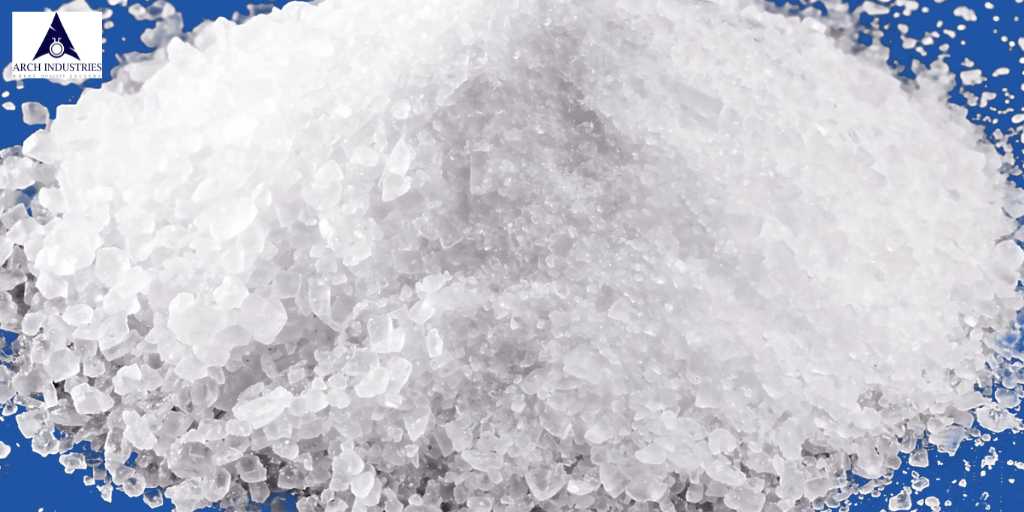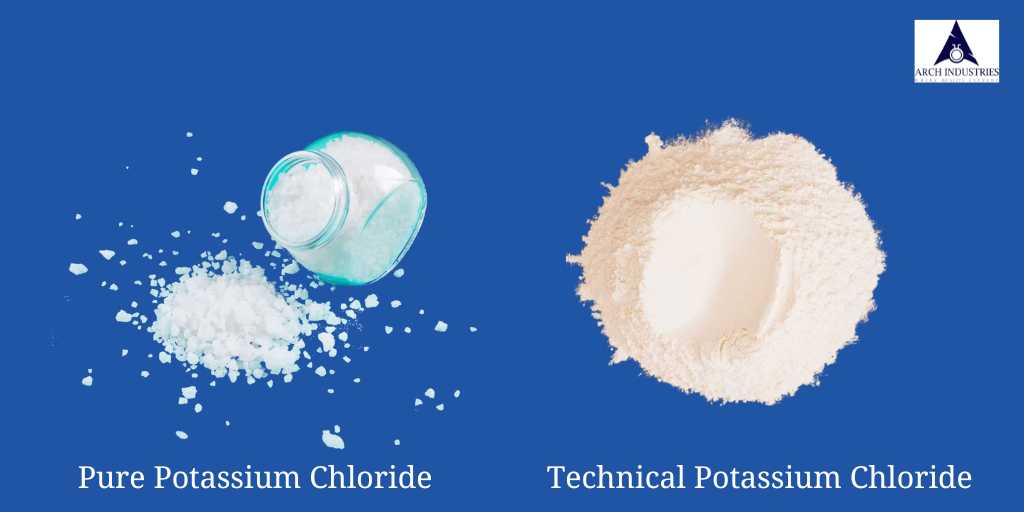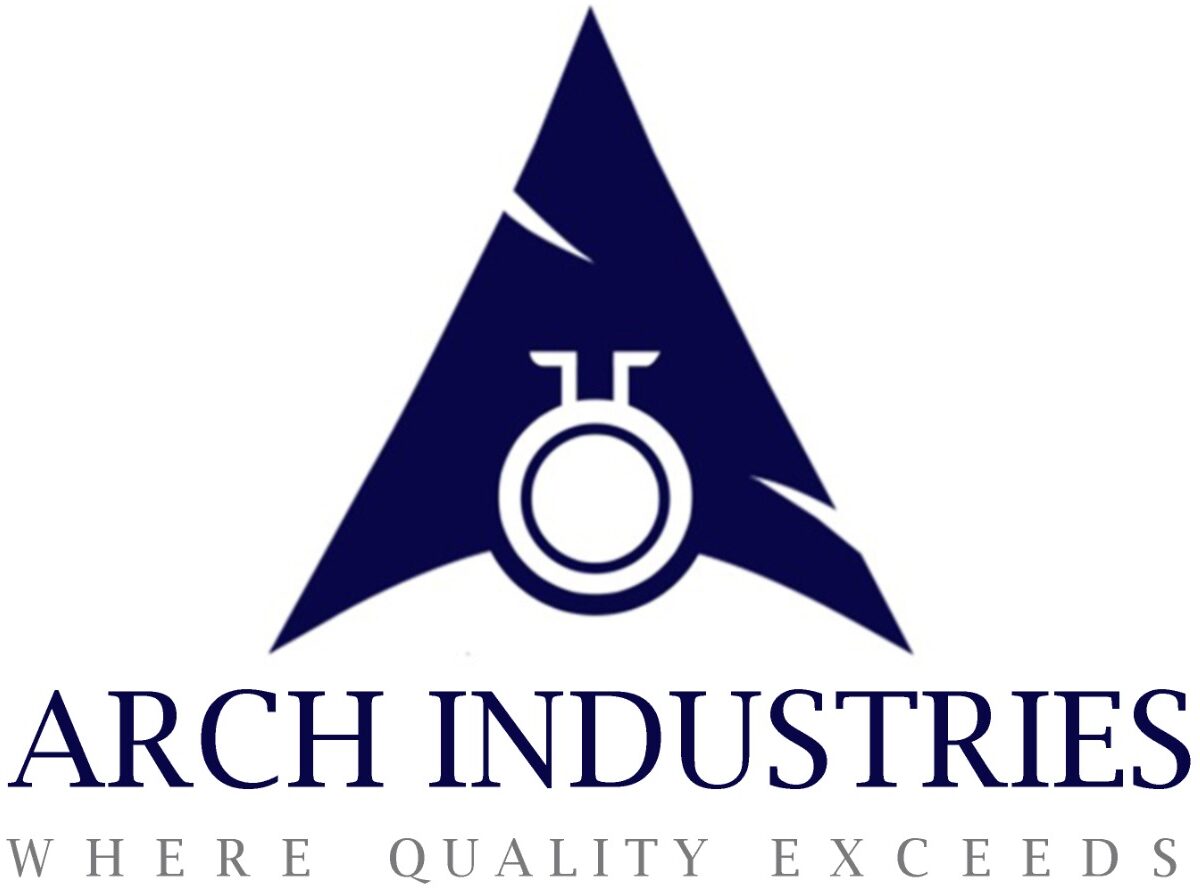
Potassium Chloride (KCl) is a vital chemical compound widely used in various industries, from agriculture to medicine. Here’s a comprehensive guide to its features, specifications, and uses.
High-purity Potassium Chloride (CAS No. 17447-40-7) is a specialty chemical produced by Arch Industries, a renowned manufacturer, supplier, and exporter in India. Arch Industries is recognized for delivering Potassium Chloride with an accurate composition and free from impurities. Utilizing high-purity raw materials and the latest manufacturing technology, our Potassium Chloride meets international industry standards. At Arch Industries, we are committed to providing top-quality Potassium Chloride with precise formulation and an extended shelf life.
Specifications Of Potassium Chloride:
- Chemical Formula: KCl
- Molecular Weight: 74.55 g/mol
- Appearance: White crystalline powder or colorless crystals
- Purity: Typically ≥ 99% (varies by grade and application)
- Melting Point: 770°C (1,418°F)
- Density: 1.984 g/cm³
- Solubility in Water: 34.2 g/100 mL at 20°C
- pH: Neutral (approximately 7 in aqueous solution)
- CAS Number: 7447-40-7
- EINECS Number: 231-211-8
Features Of Potassium Chloride:
- High Purity: Potassium Chloride is available in high-purity grades, ensuring its effectiveness in sensitive applications such as manufacturing of pharmaceuticals and food processing.
- Solubility: It is highly soluble in water, making it easy to dissolve and mix in various solutions.
- Non-toxic: Potassium Chloride is non-toxic at appropriate dosages, making it safe for use in food, agriculture, and medicine.
- Stable Compound: It remains chemically stable under normal conditions, ensuring a long shelf life and consistent performance.
- Versatile Form: Available in various forms such as powder, granules, and crystalline solids, depending on the application needs.
- Neutral pH: KCl has a neutral pH, making it suitable for applications where pH sensitivity is a concern.
- Cost-Effective: It is a relatively inexpensive source of potassium, making it an economical choice for many applications.
Usages Of Potassium Chloride:
1. Potassium Chloride Used in Agriculture
- Fertilizer: Potassium Chloride is one of the most commonly used sources of potassium in fertilizers. It promotes healthy plant growth by providing essential nutrients, enhancing root strength, and increasing crop yields.
- Soil Amendment: Used to correct potassium deficiencies in soil, ensuring balanced nutrient levels for optimal plant health.
2. Potassium Chloride Used in Pharmaceuticals
- Electrolyte Replacement: Potassium Chloride is used in oral and intravenous electrolyte solutions to treat or prevent low potassium levels (hypokalemia) in the blood.
- Tablets and Capsules: It is an active ingredient in medications that manage potassium deficiency.
3. Potassium Chloride Used in Food Industry
- Salt Substitute: KCl is often used as a low-sodium alternative in food products to reduce sodium intake while maintaining flavor.
- Food Preservative: It helps in preserving processed foods by inhibiting the growth of microorganisms.
4. Potassium Chloride Used in Industrial Applications
- Chemical Manufacturing: Used as a raw material in the production of various potassium compounds, such as potassium hydroxide and potassium sulfate.
- Water Softening: Employed in water softeners to replace calcium and magnesium ions, preventing scale buildup in pipes and appliances.
5. Potassium Chloride Used in Medical
- Dialysis: Potassium Chloride is used in dialysis solutions for patients with kidney failure to help maintain electrolyte balance.
- IV Solutions: It’s a key component in intravenous fluids administered to patients who need potassium replenishment.
6. Potassium Chloride Used in Laboratory Uses
- Standard Solutions: Used as a standard solution in analytical chemistry for calibrating and testing equipment.
- Buffer Solutions: KCl is part of buffer solutions used in various laboratory experiments to maintain stable pH levels.
Potassium Chloride’s Safety and Handling
- Storage: Store in a cool, dry place away from moisture and incompatible substances.
- Handling: Use protective equipment, such as gloves and safety glasses, to avoid contact with skin and eyes. Avoid inhalation of dust.
- First Aid: In case of contact with eyes or skin, rinse thoroughly with water. If ingested, seek medical attention immediately.
Types of Potassium Chloride

Potassium Chloride (KCl) is available in various forms and grades, each tailored for specific applications. Here’s an overview of the different types:
1. Potassium Chloride Agricultural Grade
- Description: This is the most commonly used form of Potassium Chloride, specifically designed for use as a fertilizer.
- Features: High potassium content, typically 60-62% K2O equivalent, with good solubility.
- Uses: Widely used in agriculture to provide essential potassium for crops, improving yield and overall plant health.
2. Potassium Chloride Pharmaceutical Grade
- Description: This is a high-purity form of Potassium Chloride used in medical and pharmaceutical applications.
- Features: Extremely pure, free from contaminants, and meets stringent regulatory standards.
- Uses: Used in electrolyte solutions, intravenous fluids, and oral potassium supplements to treat or prevent potassium deficiency in the body.
3. Potassium Chloride Food Grade
- Description: Potassium Chloride that meets the standards for use in food products.
- Features: Purity levels suitable for consumption, often used as a sodium-free salt substitute.
- Uses: Commonly used in processed foods to reduce sodium content, as well as in food preservation and flavor enhancement.
4. Potassium Chloride Industrial Grade
- Description: This form is designed for various industrial applications, where high purity is not as critical as in food or pharmaceutical uses.
- Features: Sufficient purity for industrial processes, available in different particle sizes.
- Uses: Used in chemical manufacturing, water treatment, and as a raw material in the production of other potassium compounds.
5. Potassium Chloride Crystal and Granular Forms
- Description: Potassium Chloride is available in different physical forms, including crystals and granules.
- Features: Crystal form is typically used in pharmaceutical and food applications, while granular form is more common in agriculture and industrial uses.
- Uses: Crystal form is preferred in applications requiring high solubility and purity, while granular form is used where ease of handling and spreading is needed.
6. Potassium Chloride USP Grade (United States Pharmacopeia)
- Description: This is the highest purity grade of Potassium Chloride, meeting the stringent requirements of the United States Pharmacopeia.
- Features: Extremely high purity, free from impurities, and suitable for use in critical pharmaceutical and medical applications.
- Uses: Used in the formulation of IV fluids, dialysis solutions, and other medical products requiring the highest quality standards.
7. Potassium Chloride Reagent Grade
- Description: This form is used primarily in laboratory and research settings.
- Features: High purity, consistent quality, and meets the specifications required for analytical and research purposes.
- Uses: Employed in chemical analyses, standard solutions, and buffer preparations in laboratories.
Manufacturing of Potassium Chloride is a versatile compound with widespread applications across numerous industries. Its high purity, stability, and solubility make it an essential ingredient in agriculture, medicine, food processing, and industrial manufacturing. Whether used as a fertilizer, a food additive, or a medical treatment, Potassium Chloride continues to be a vital resource in both commercial and industrial settings.
FAQ’s
Q1. What is Potassium Chloride and what are its main uses?
A: Potassium Chloride (KCl) is a white crystalline salt used as a primary source of potassium in fertilizers, as a salt substitute in food processing, in water-softening systems, and as a raw material in various chemical and industrial processes.
Q2. Why is Potassium Chloride important for agriculture?
A: Potassium Chloride provides essential potassium, improving soil fertility, supporting root development, enhancing drought and disease resistance, and increasing crop yields.
Q3. In which industries is Potassium Chloride commonly used besides agriculture?
A: It is used in food processing, water softening, chemical manufacturing, pharmaceuticals, and industrial applications including drilling fluids and chemical processes.
Q4. What form and quality standards should one expect from good commercial-grade Potassium Chloride?
A: High-quality Potassium Chloride comes as white or colorless crystalline powder or granules, is highly water-soluble, has minimal impurities, and meets purity and moisture specifications suitable for its intended use.
Q5. How should Potassium Chloride be stored and handled safely?
A: Store in a cool, dry, well-ventilated place away from moisture. Use protective gear when handling in bulk, avoid dust inhalation or direct contact, and keep containers sealed to maintain purity and prevent degradation.

